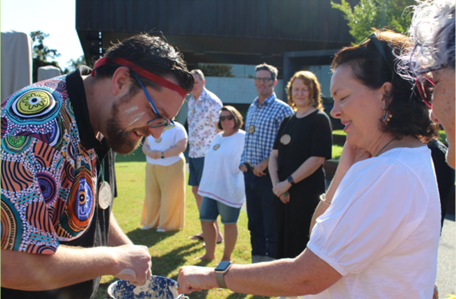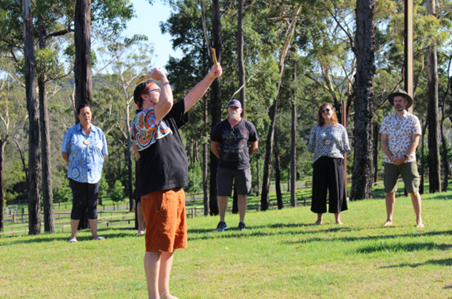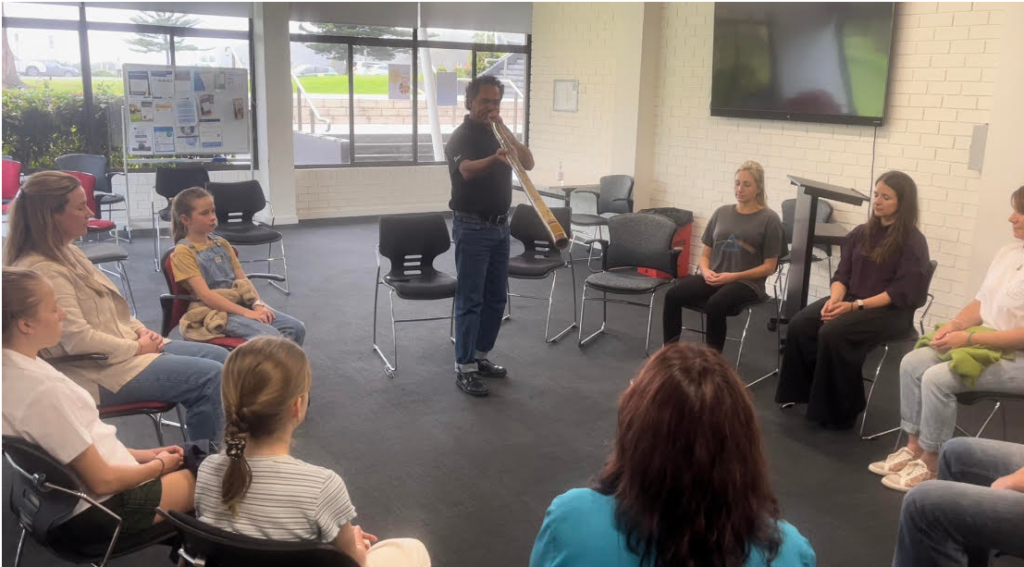Foundation for Rural & Regional Renewal (FRRR)
A small investment in tools or equipment often doesn’t just generate practical outcomes for communities but also provides a foundation for community groups to build their confidence.
In the case of the Dunn Lewis Youth Foundation in NSW’s Shoalhaven region, the Youth Local Podcast Program has provided young people with more than just a microphone. It’s given them an opportunity to find their voice and feel more empowered, while also exploring, learning and connecting with their community.
Even for those initially hesitant, the experience has been transformative. Mia told us, “If I’m going to be honest, I was not keen for this, but now it’s the highlight of my week. It’s really fun, and the whole process of having ‘Living Skillfully’ as a segment within Youth Local has been really good.”
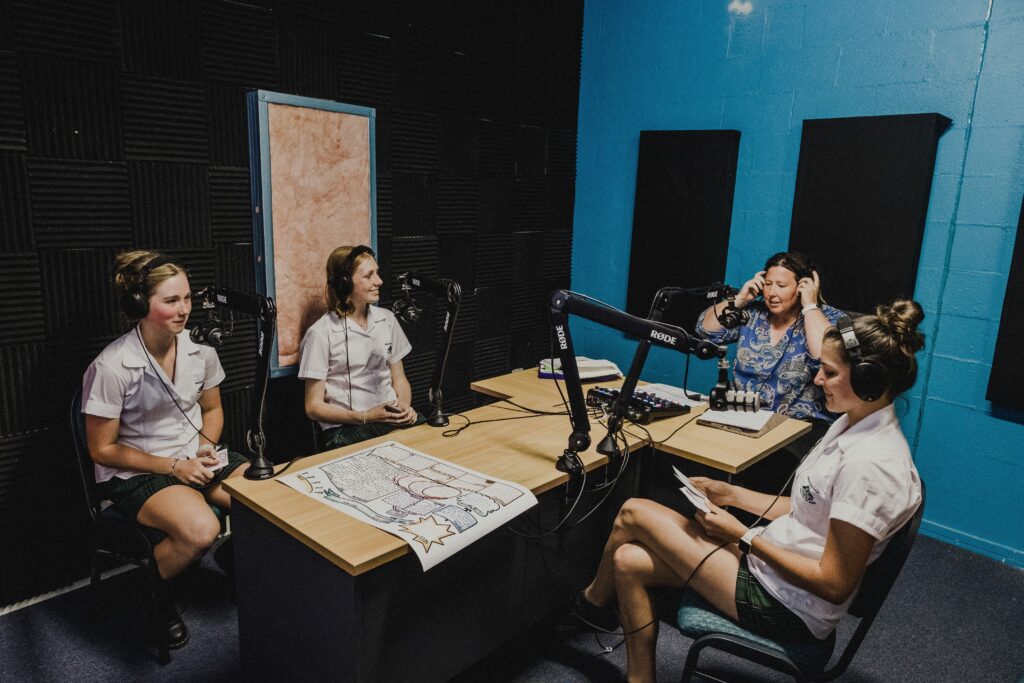
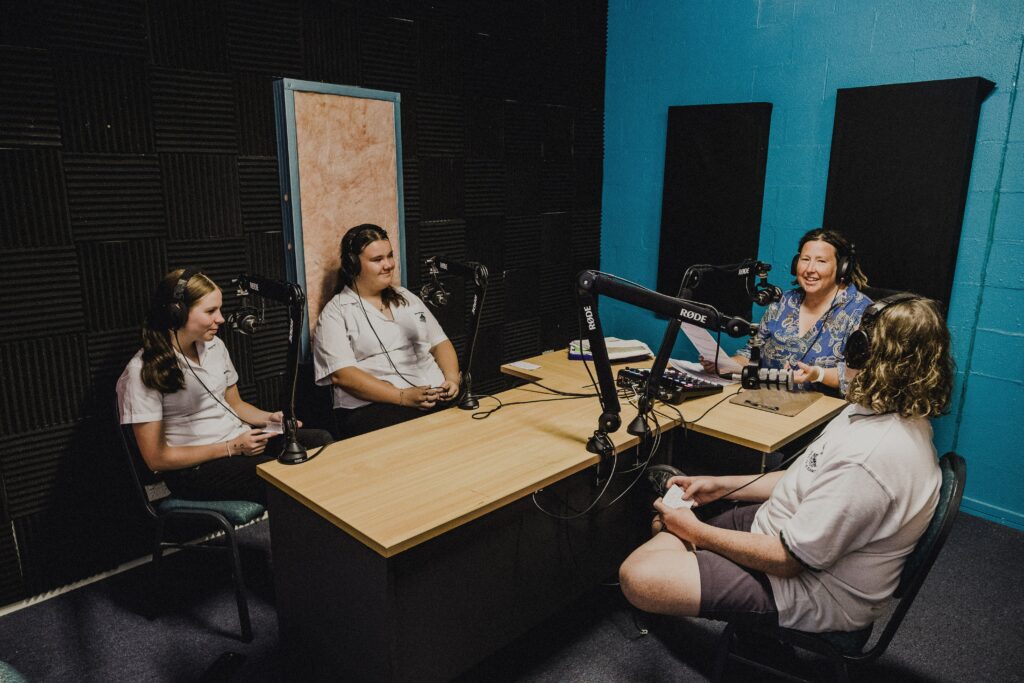
For Darcy, another one of the participants, podcasting has opened doors to new experiences and skills. “I’ve loved podcasting; it’s been an amazing opportunity. Not only do I get to meet awesome people, but I also get to try out new things every week and explore topics that I’m really passionate about.”
Darcy’s enthusiasm for the creative freedom that podcasting offers is infectious, and it’s clear that this program is more than just a hobby – it’s a pathway to a potential future career. “It’s got me inspired to actually explore this as a career path,” Darcy added, reflecting the broader impact of the initiative.
Claire, another dedicated podcaster, shared how the program has helped her grow in ways she didn’t expect. “Podcasting has been an amazing experience because I’ve gotten to meet new people and learn more about our local area and some strange facts that I did not know before.”
The group of podcasters shared the skills they were learning along the way including: planning, communication with peers and others outside the community, patience and listening skills, as well as technical skills like editing and using the deck.
These quotes aren’t just words; they are a testament to the value of giving youth a voice. As Jasper aptly put it, “I’ve learned that everyone is a little bit goofy in their own way doing this podcast,” and, “It allows you to be who you want to be.”
This program isn’t just about teaching technical skills – it’s about creating a safe space for self-expression, community engagement and personal growth. In a world where youth voices are often underrepresented, this podcast has become a powerful tool for empowerment. It serves as a reminder that when young people are given the tools and the platform, their voices can be both insightful and impactful. It leaves us with a thought-provoking question: what other untapped potential lies within our youth, just waiting for the right opportunity to be unleashed?
Local leaders play a critical role in the community. They are the driving force behind the growth and long-term sustainability of remote, rural and regional communities. But they also need to build their capacity.
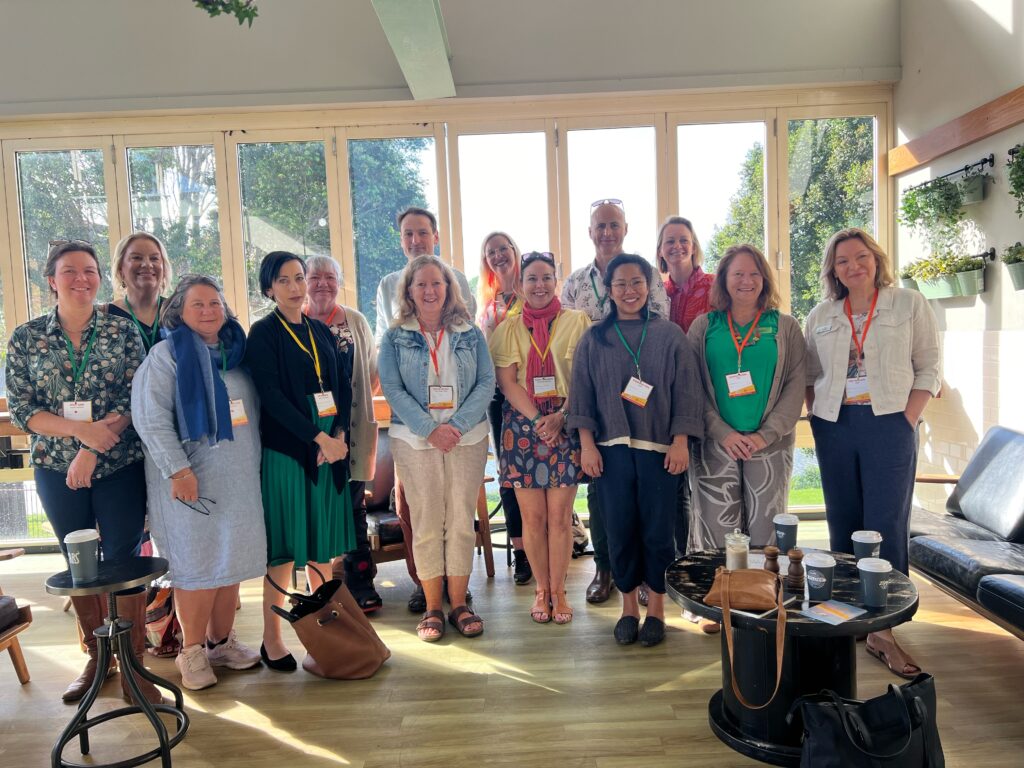
FRRR was pleased to be able to support IRCF participants to attend the Social Impact in the Regions (SIITR) Conference held on Dungutti Country in the community of Kempsey, NSW. It’s focus was on investing in regional impact, empowering regional voices and understanding regional challenges.
This year’s delegation of 12 local leaders travelled from the Yuin Country communities of Nowra, Bay & Basin and Bega Valley and Nambucca Valley on Gumbaynggirr Country. Not only did they learn heaps but it was also a great way to build connections across communities and to meet more of the FRRR team.
Drawing on our participatory practice training, we started on the first day with a connection opportunity and check in overlooking the Macleay River, to share our intention for the next few days. This was then followed by a warm welcome to Country by Uncle Fred Kelly. Our People Portfolio Lead, Deb Samuels, co-hosted a master class on place-based design with Jesse Taylor, Jo-Anne Kelly and Chad Renando, sharing their place based experiences, and on the final day our CEO, Natalie Egleton, presented a keynote on Regional Challenges and Strengths. She highlighted how some of our community partners have flipped the narrative around how hard things are in remote, rural and regional communities to create strong, vibrant communities.
There were a lot of learnings throughout the three days. The standouts included the innovative adaptation of an event space – activating the main street of Kempsey utilising disused shopfronts – really emphasising the conference being IN community as apposed to AT a community – a huge and noticeable change from the inaugural conference, which was held at a conference centre. There were a lot of ideas that could be replicated in other communities. Youth participation and the inclusion of students from two Kempsey high schools was also great to see. These young people shared their aspirations and explored how enterprise models can support their endeavours. Another learning was how local voices can be amplified through the Ready Communities model.
On returning home, the local leaders who attended shared their gratitude for being supported to attend.
“Julie, our emerging leader, and I both enjoyed the conference immensely, especially the connection with new people and the wonderful opportunities we heard about. The conference dinner was fun, surprising and an unexpected treat from the usual conference dinners. We certainly have lots to think about and are now back at work and looking at what I can start putting in to practice.”
Nicki, Noah’s Inclusion Services, Nowra
Karen from the Bay and Basin Community Resources shared, “It was really great to get out and discuss new ideas, explore different models and network. It has been invaluable and very inspiring. We are already starting to put into practice some of our takeaways.”
Investing in people is a key pillar in the Investing in Rural Community Futures program and we recommend that you keep a close eye on any regional development or leadership opportunities and put your hand up for anything that comes your way. The ripple effects of these types of opportunities can last for years and reach many.
To build long-term capacity, community organisations must have systems in place that allow them to deliver their services efficiently and effectively.
We saw this in action at Cooinda Court Aged Care, when the organisation undertook significant upgrades to their systems after receiving nearly $70,000 in Investing in Rural Community Futures (IRCF) grants.
They used the funds to modernise Cooinda Court’s systems, installing new technology to improve management of medication systems, clinical care records and communication. All of this was critical to them being able to continue to operate.
Understandably, there are strict accountability requirements in the Aged Care Standards, which require high levels of corporate governance and due diligence, especially around decision making and financial management.
This investment in the IT and Care Management Program was central to Cooinda being able to meet the increased regulation of the aged care sector, as well being able to attract and retain appropriately skilled Board members and executive staff. The new IT infrastructure also increased data security.

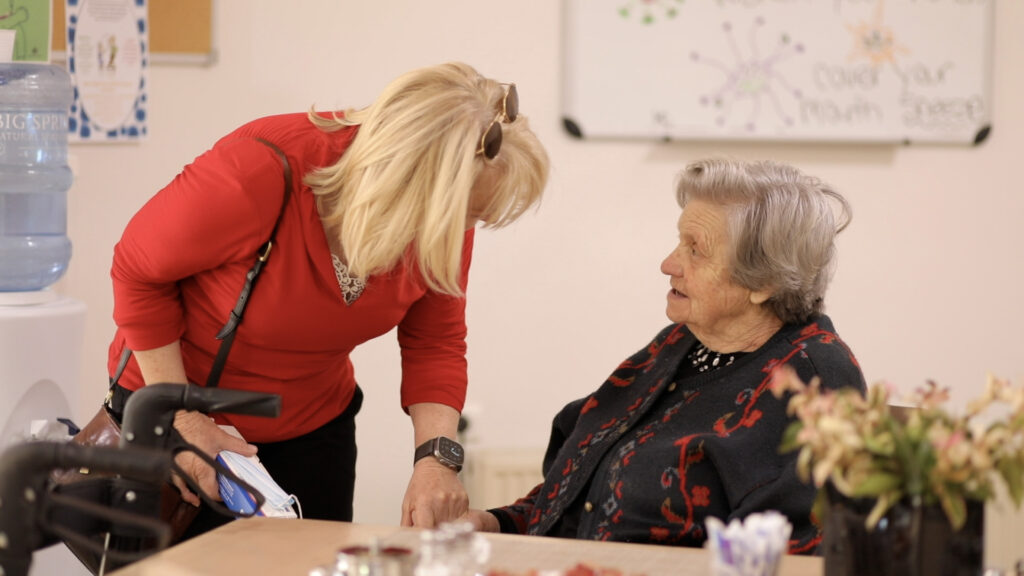
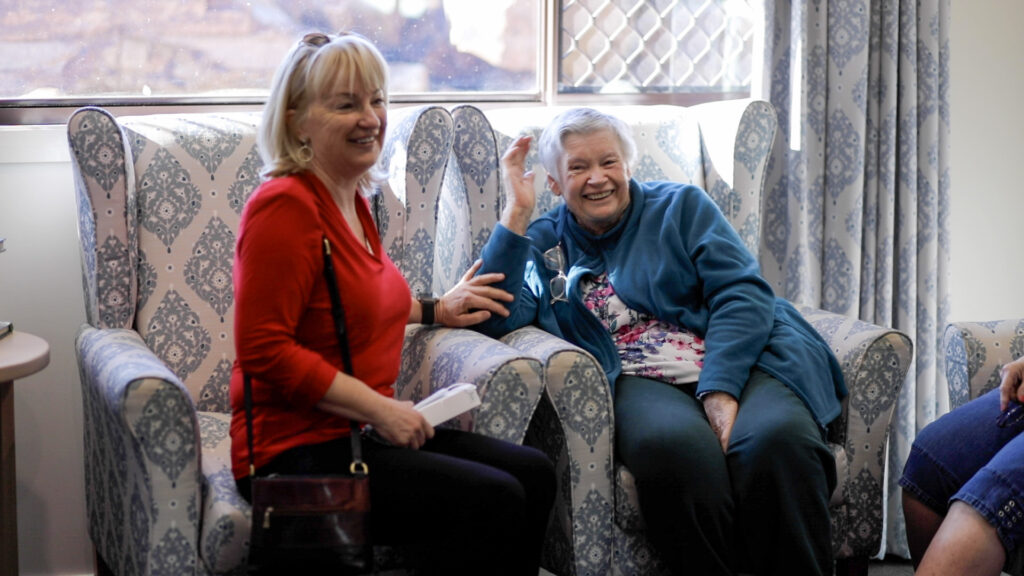
Organisational outcomes
Staff report that the new care management system has led to streamlining information collection and management and the upskilling has positively impacted on their confidence and increased literacy. The Board can access documents across the whole organisation, which is a requirement of the Aged Care Standards.
With the installation of MANAD (the electronic care system) and training for staff on this new system, Cooinda also reported better connections with the hospital and doctors. One staff member said, “The new software enables the doctor to be more involved… it’s a spin off”.
At their most recent accreditation visit as of November 2023, Cooinda achieved 100% compliance with the Aged Care Standards. This is a significant achievement largely supported by the IRCF funded IT upgrades.
With the focus of Cooinda Court being to care for frail and elderly people, the continuation of this facility in Junee is critical to maintaining quality local aged care.
A staff member says, “It allows our elderly to be with their family, but also in familiar environments. They used to be sent away, and that could have been up to two hours a trip for family. And if they have a spouse, then that spouse very seldom could make that journey. And these people never survived long.
“So, it is very important for us to keep our community members here because they’ve been a part of our community, when we were young and defenceless, they nurtured us. And that’s what we do now. We look after our residents in an environment that’s solely theirs, where they are protected, and we advocate for them.”
FRRR has today announced that 19 community organisations across Australia will share more than $157,766 from the FRRR ABC Heywire Youth Innovation Grants program grants to implement projects based on the ideas generated at this year’s ABC Heywire Summit in Canberra.
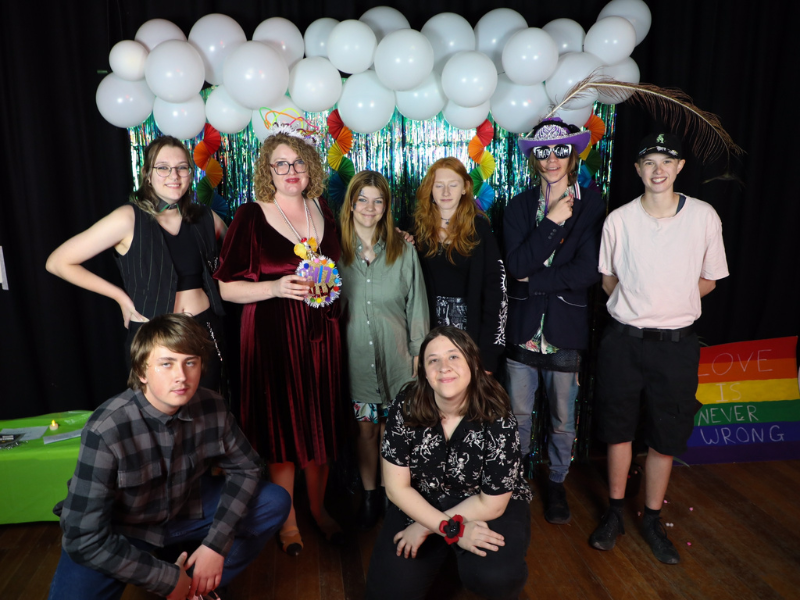
This year’s grants will help activate projects based on four of the ideas developed at the annual youth summit, all of which respond to issues that concern young people in remote, rural and regional Australia.
The original ideas were:
As part of FRRR’s commitment to supporting the transition of leadership to the next generation, the successful grants were reviewed and recommended by a Youth Assessment Committee, under the guidance of FRRR Directors and staff. FRRR also employed two interns, both former Heywire winners, over the last few months, who assisted with the program administration and assessment.
Mahsa Nabizada, Youth Assessment Committee Chair, said, “The Heywire Grants offer an incredible opportunity for young people from all corners of Australia to bring their ideas to life and actively shape their communities. It’s empowering to see these young leaders take ownership of the challenges they face and turn them into meaningful change. These grants show that when we invest in young people, we’re investing in the future of our communities.”
Deb Samuels, FRRR’s People Portfolio Lead said that pleasingly, many of these projects funded will be led by the young people that they are designed to benefit.
“Representation matters and valuing the lived experience and unique perspectives of young people is vital, so we’ve actively sought ways to involve more young people this year, plus we actively invited young people to apply for the grants. And it worked, as we saw a significant uptick in the number of applications for projects led by young people. After all, who better to know what’s going to work for other young people than their peers.
“For example, Riverland Youth Theatre has received a grant to implement The Bigger Picture idea. Led by a Heywire winner, the funds will support nine months of activities, including monthly events tailored to the interests of young people in that part of the Mallee, with a focus on queer and socially isolated youth. This kind of project is exactly why we love this program so much. It will not only deliver on the issues that the Heywirers raised at the national Summit, but in doing so, it will also build leadership skills and create employment opportunities for young people.
“This round we also saw the largest number of projects we’ve funded in Queensland, thanks to The John Villiers Trust and The Clem Jones Group. Their support has meant that we can fund seven wonderful initiatives in six communities. I really can’t wait to see what impact each of these projects has in their community over the coming year,” Ms Samuels said.
Justin Stevens, ABC Director News, said that the ABC Heywire Summit brings forth ideas created by young individuals from regional communities, aimed at benefiting their peers. “These grants provide remote, rural, and regional areas with a practical way to inspire the next generation of leaders to voice their concerns and take action on issues that matter to them and their communities.”
These grants are generously co-funded by contributions from The Sally Foundation, The John Villiers Trust, The Clem Jones Group, David Mactaggart Foundation, and several private donors. This funding announcement brings the grants total to more than $1.7 million over the last 13 years.
The full list of recipients and a snapshot of their projects are below.
| Organisation | Project | Location | Grant | |||
|---|---|---|---|---|---|---|
| NEW SOUTH WALES | ||||||
| The Dunn & Lewis Youth Development Foundation Limited on behalf of Connect 4 Community | The Bigger Picture Enhance community identity and wellbeing by creating social spaces and activities for young people. | Ulladulla | $4,000 | |||
| The Dunn & Lewis Youth Development Foundation Limited on behalf of Live Skillfully | MEE (Mentoring Educating Empowering) Equip young people with essential life skills and boost their confidence for post-school life. | Ulladulla | $2,200 | |||
| The Returning Indigenous Corporation | Youth 2 Grassroots | Alstonville | $10,000 | |||
| QUEENSLAND | ||||||
| Ability Agriculture Foundation Limited | The Bigger Picture Empower students with disabilities in agriculture by funding Vegepods for 10 rural schools, promoting inclusive education and fostering interest in agricultural careers. | Various Locations | $10,000 | |||
| Beaudesert State High School P&C Association | The Bee Your Personal Best Project Strengthen food security education by funding an apiary at Beaudesert State High School, enhancing student engagement, community involvement, and environmental understanding. | Beaudesert | $7,764 | |||
| Bundaberg Regional Council | A Place for You | Bundaberg | $10,000 | |||
| Co-Exist Australia Ltd | Youth 2 Grassroots Empower youth leaders to sustain environmental action by funding Collective Leaders, ensuring consistent monthly events and enhancing wellbeing for young participants. | Cairns | $9,960 | |||
| National Rural Health Student Network | MEE (Mentoring Educating Empowering) Promote rural health careers inspiring Indigenous students in rural and remote QLD to pursue health careers, to enhancing healthcare access and representation. | Yarrabah | $10,000 | |||
| The Trustee for Top Blokes Foundation | MEE (Mentoring Educating Empowering) Inspire young men in schools through a peer-led mentoring and personal development program. | Toowoomba | $10,000 | |||
| SOUTH AUSTRALIA | ||||||
| Barmera District War Memorial Community Centre Inc on behalf of Part of Things | The Bigger Picture Establish a creative youth space for young people to come together and connect. | Port Lincoln | $10,000 | |||
| Riverland Youth Theatre | The Bigger Picture Establish a '3rd place' program for young people to come together and connect. | Renmark | $9,995 | |||
| The South Australian Youth Forum Inc | The Bigger Picture Enable regional youth to have their voices heard as part of a regional youth forum tour. | Various Locations | $10,000 | |||
| TASMANIA | ||||||
| Huon Valley Police & Community Youth Club Inc | A Place for You Create a space for youth to come together and foster supportive networks and connections. | Huonville | $9,702 | |||
| St Helens Neighbourhood House Association Inc | The Bigger Picture Foster an inclusive community with a youth-led LGBTQIA+ community event. | St Helens | $8,125 | |||
| THEIRS Inc | A Place for You Improving mental health awareness for youth with a mental health advocate tour across Tasmania. | Burnie | $10,000 | |||
| VICTORIA | ||||||
| Seed Indigenous Youth Climate Network Ltd | Youth 2 Grassroots Empower rural youth with skills to become leaders in grassroots climate advocacy at a national camp. | Various Locations | $10,000 | |||
| Wycheproof Community Resource Centre Inc | The Bigger Picture Provide Wycheproof youth with their own space with a kitchen renovation, outdoor garden and podcast series. | Wycheproof | $4,020 | |||
| WESTERN AUSTRALIA | ||||||
| Green Skills Inc | Youth 2 Grassroots Promote sustainable fashion and waste reduction through upcycling workshops and fashion show. | Denmark | $9,000 | |||
| Shire of Cunderdin | A Place for You Empower Cunderdin youth with mental health support and coping strategies in a one day event with workshops and presentations. | Cunderdin | $3,000 | |||

Nambucca Valley Phoenix (NVP) received two IRCF Partnership Grants in addition to support through Toolbox funds to contribute to a group of local NFP’s undertaking a feasibility study into collective fundraising for the Nambucca Valley.
NVP’s initial project focused on the development a five-year strategic plan, with a particular focus on creative economy options and pathways to rebuild after a failed merger.
In 2021, they moved onto developing strategies and tools to attract funding. This was activated through communications upgrades, including a website and sponsorship packages. The Coordinator’s wage was also subsidised bring in other support and allow them time to implement a business plan, research and develop strategic fundraising pathways and connections and to share their learnings with other NFPs.
Making solid inroads
Having the five-year strategic business plan has been greatly beneficial in assisting NVP to gain funding and build reputation. The plan has demonstrated their professionalism to stakeholders and provided NVP with a roadmap for redefining and rebuilding.
As a result of FRRR support, NVP also leveraged the Social Sector Transformation Fund, a NSW Government initiative to help small to medium sized charities and NFPs. Through this they developed a Theory of Change, Impact Measurement and Pathways to Sustainability report by Social Enterprise Finance Australia. These documents were developed to further assist NVP to secure financial assistance required as it rebuilt its services through illustrating the organisations social impact. The work done as part of this project will continue to support NVP well into the future, as they say, teach a fisherman to fish…
Since starting this project NVP has leveraged more than a million dollars’ worth of project funding. These projects include much needed capital funding to replace redundant and defective infrastructure and equipment and the development of an accessible carpark, multi-year youth program funding, funding to develop arts and exhibition programs and to support our social enterprises. They have also hosted the Disability Arts Award and the inaugural Winter Ball, bringing community and the disabaility sector together in a joyful celebration of inclusion.
“We created a five-year strategic plan to assist us to build a sustainable social enterprise that creates an inclusive place for people to come together to learn, earn and enjoy the benefits of art, food and community, while still supporting people with disability to engage in meaningful employment and learning programs such as arts.”
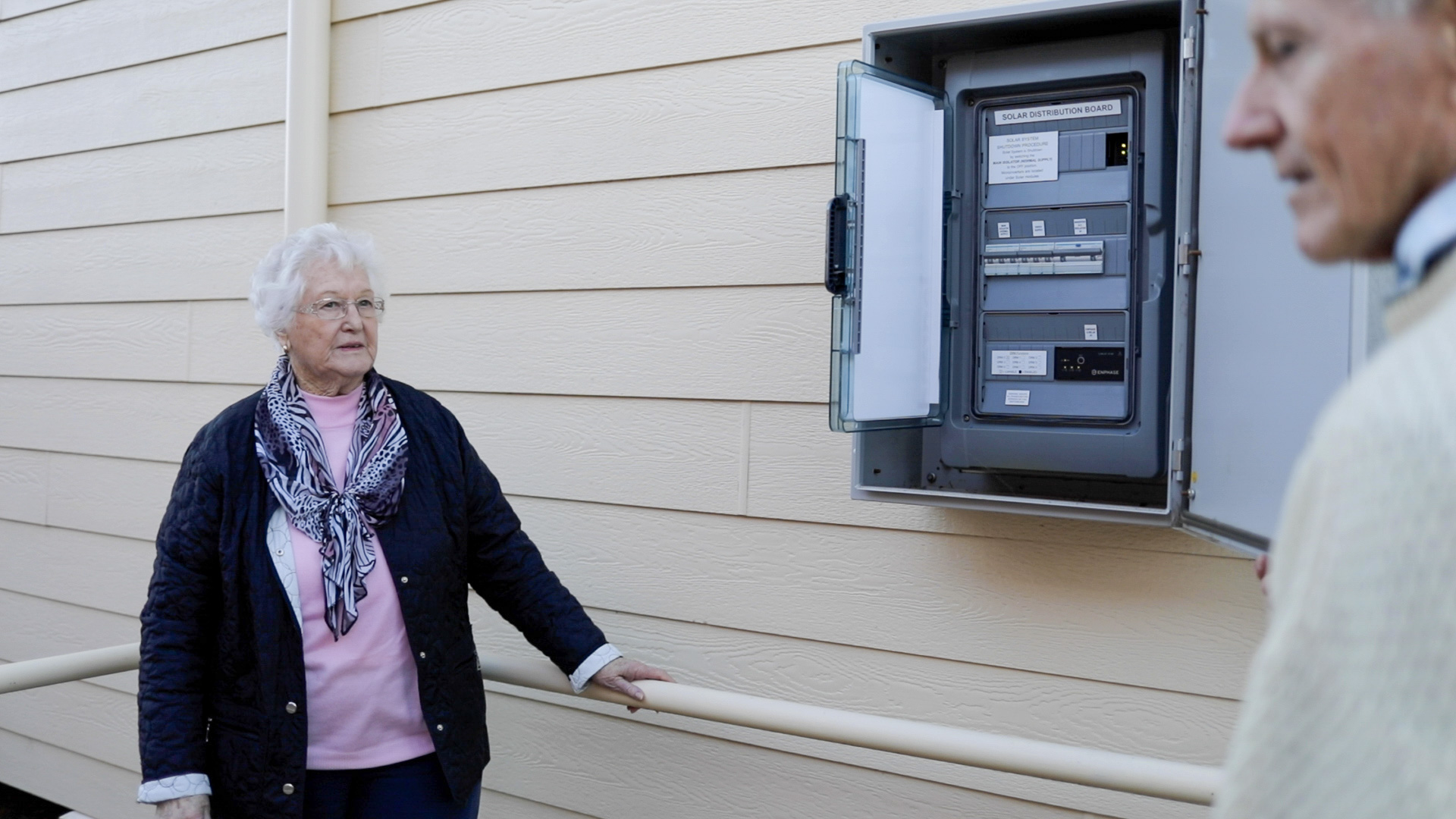
In 2020, Junee Community Power (JCP) introduced a circular funding model to allow local community groups and NFPs to install solar power on their premises to help reduce their operating costs. They also gained access to equipment to complete energy assessments on buildings, which they now offer as part of their service model.
The organisation is fully led by volunteers and, in the later stages of the IRCF program, has accessed some administration and feasibility support from FRRR. Over the course of the IRCF program, the organisation has been able to refine its processes by:
Lasting community impacts
They have successfully supported two community organisations to apply for funding to install solar power and improve energy efficiency – Junee Community Centre and the Senior Citizens Centre.
One of the board members said the system is already even more than they had hoped. “Junee Community Centre has paid back to the circular fund years before we expected. This has enabled more upcoming projects – big and small. We can also go back to the Community Centre to look at what else they need.”
JCP also assisted the Senior Citizens Centre to apply for funding for re-wiring, and a new fridge and stove, which were funded by IRCF. Community members are now using the Centre more often and for longer periods of time.
Shovel-ready to support community through the renewable energy transition
JCP remains incredibly active at the culmination of the IRCF program in their area. The group is working on disaster preparedness, with Junee and Illabo Showgrounds both being considered as places of last resort during natural disasters etc. JCP is also working closely with the regional Organisation of Regional Councils Riverina Eastern (REROC) as a potential regional partner and received funding through IRCF to undertake a feasibility study to support this work.
“When government funding becomes available for community batteries later in the year, we’re in a shovel-ready position now to make an application, we’ve got the costing and we’ve got the feasibility already done.”
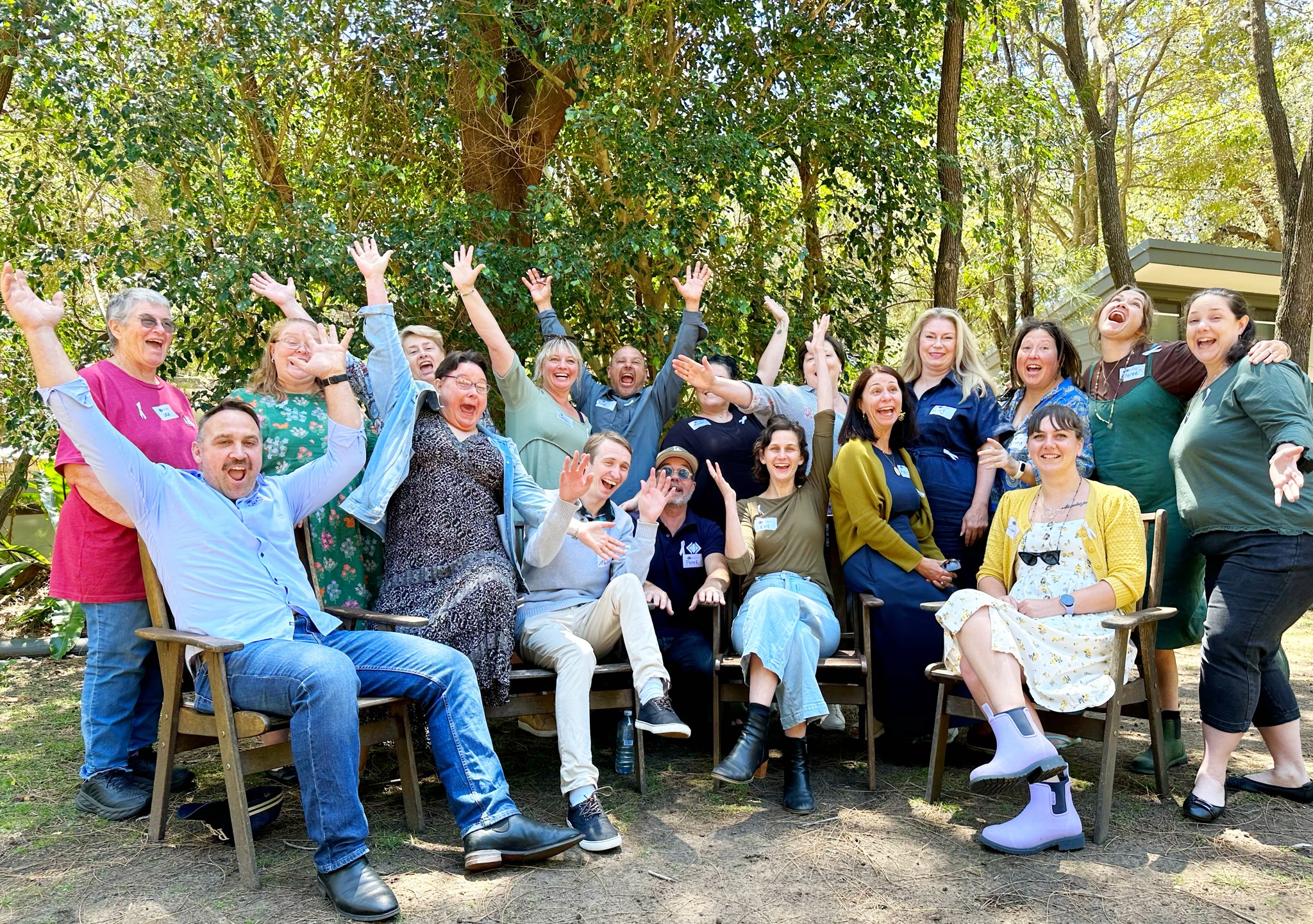
The below was written by Kate McBride, Community Facilitator in Bay and Basin
At a recent Changemakers workshop in the Shoalhaven, we heard the analogy that being a changemaker is like being in a relay race. We sprint with the baton, pushing for change and progress, but in reality, it’s not solely on our shoulders to cross the finish line. We pass the baton on and share the collective responsibility of creating change. Each person’s contribution in creating change is crucial, and together we cover the distance needed to create lasting impact in our communities.
In the heart of every thriving community lies the united effort of its members, working together to foster growth, resilience and progress. Here, on the South Coast, we are not short of these amazing community members. Fatigue though, had set in and our community was – and still is – weary after living through the 2019 Currowan Bushfires, multiple floods and COVID.
As part of the Investing In Rural Community Futures program in the Shoalhaven, we partnered with the Australian Rural Leadership Foundation to offer an eight day intensive leadership program for 22 participants in the Shoalhaven.
As a Community Facilitator, I feel very fortunate to have been one of the participants. Attending this program has had a transformative impact on myself and the other 21 participants – equipping us with the skills, insights, energy and networks to drive positive change in our communities.
The program fostered personal growth and enhanced our leadership capabilities through immersive experiences and diverse learning opportunities. We emerged from the program with a deeper understanding of rural challenges and the growing confidence to tackle them.
The most significant impact for me though, was the development of a strong, supportive network for us all that has extended beyond the duration of the course. We have celebrated triumphs, troubleshooted issues and delighted in the opportunity to cross paths again. And, most importantly, we have a revitalised relay team, ready to carry that baton of change a bit further in our communities.
Seventy-nine community groups across remote, rural and regional Australia are sharing more than $730,000 in grants, thanks to FRRR’s flagship Strengthening Rural Communities (SRC) program.
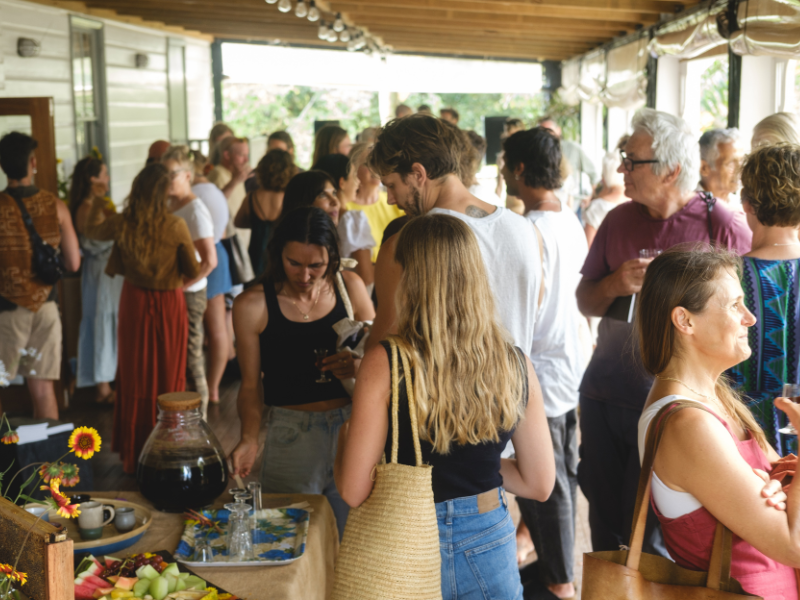
The grants are awarded through two streams of funding – one that focuses on ‘small and vital projects’ that enhance the vitality and liveability of these country communities, and another that focuses on disaster recovery and preparedness.
FRRR Place Portfolio Lead, Jill Karena, says that as in recent rounds, most projects are seeking to innovate or respond to local opportunities, or enhance community identity, wellbeing and a sense of place – but there are different priorities across the country.
“That’s the beauty of this program. It’s flexible, so it can respond to the priorities of each individual place. But there are some common themes, including building community resilience and local disaster preparedness, especially when it comes to having a self-sufficient centre that can support the community during or after a disaster; responding to increasing food insecurity as costs of living rises; filling gaps caused by more people moving into more rural and remote areas, which in turns drives up demand for community support services – especially specialist services like disability support, First Nations literacy or responding to neurodiversity.
“The focus we saw last round on support for small-scale infrastructure or equipment continued, as more local NFPs take on the management and maintenance of community facilities to ensure they aren’t lost. These kinds of facilities are critical to maintaining social connection, as well as being critical hubs from which visiting services such as mobile playgroups and regular exercise classes operate, or as a place to host critical meetings, so ensuring they are fit for-purpose is vital,” Ms Karena explained.
Some of the projects funded include:
The SRC program is collaboratively supported by donors, ranging from private individuals to larger foundations, who are acknowledged on the FRRR website. However, demand for funding continues to outstrip what FRRR has available, with this round seeing more than 60 ‘funding-ready’ and worthy small and vital projects seeking $680,000 in support missing out. If you would like to help, you can donate at www.frrr.org.au/donate.
FRRR always accepts applications to this program, which awards funds around four times a year. Local not-for-profit organisations and community groups are encouraged to review the program guidelines and apply. More information about the SRC program is available at www.frrr.org.au/src.
The full list of grant recipients and their projects are below.
| Organisation | Project | Location | Grant | |||
|---|---|---|---|---|---|---|
| SRC Round 21 - August 2024 | ||||||
| NEW SOUTH WALES | ||||||
| Small & Vital | ||||||
| Australian Ocean Laboratory Limited | Wagonga Inlet Monitoring Project Monitor environmental impacts on Wagonga Inlet's marine ecosystem with monitoring buoy built by students. | Narooma | $10,000 | |||
| Casinos Own Wireless Association Inc | Casino’s Own Wireless Partial Kitchen Renovation Renovate Casino’s community radio station's kitchen to enhance safety and accessibility for elderly and vision impaired volunteers. | Casino | $1,380 | |||
| Elm Grove Sanctuary Ltd | Out of Class Room Learning (OCL) Expand opportunities for students experiencing economic, social and psychological challenges with hands on learning activities over four terms. | Narooma | $7,739 | |||
| Lake Cargelligo District Community Children's Centre Assoc Inc | For Our Community Alleviate disadvantages and enhance the centre by painting the classrooms to create a welcoming and vibrant environment. | Lake Cargelligo | $10,000 | |||
| Mendooran Pre-school Incorporated | Community Governance Capacity Building Host a governance workshop for over 20 community organisations to enhance capacity and foster local connections. | Mendooran | $6,000 | |||
| Police Citizens Youth Clubs NSW Ltd | PCYC Walgett School Holiday Activity Passes Promote social connections, exercise, and skill development for Indigenous children and those experiencing disadvantage through a free school holiday program. | Walgett | $9,900 | |||
| Sanctuary Point Public School lead by NSW Government Schools | SWAY: Sounds, Words, Aboriginal Language and Yarning Construct a yarning circle for families and educators to conduct children's learning sessions with a certified speech pathologist. | Sanctuary Point | $10,000 | |||
| Taree Universities Campus Ltd | Creating a Gloucester Community Study Hub Establish a study hub with computers, printers, and a welcoming kitchenette to foster educational and personal growth. | Gloucester | $10,000 | |||
| Urunga Business and Community | Air Conditioning the Urunga Literary Institute Hall Enhance organisational capacity by installing air conditioning units in the Urunga Hall. | Urunga | $10,000 | |||
| Wauchope Regional Arts Project - WRAP Inclusive Arts lead by Wauchope Community Arts Council Incorporated | Fostering Inclusion through Art - A Community Mural Project Create a collaboration between local artists with disabilities and professional artists to create a mural on the Post Office wall. | Wauchope | $10,000 | |||
| Wentworth Military Collection Inc | Leaders Exhibition Purchase reproductions of Military Leaders' uniforms for a mobile exhibition fostering student leadership, engaging veterans, and providing historical education. | Wentworth | $9,191 | |||
| Prepare & Recover - 2019/2020 Bushfire Recovery | ||||||
| Capertee and District Progress Association Incorporated | Dinner Dance Enhance bushfire recovery and community connection through a dinner dance with live music entertainment. | Capertee | $800 | |||
| KidsXpress Limited | Tumut Community Partnership Provide free therapy for children, and workshops and trauma aware strategies for teachers and carers to address mental health issues from the 2019/20 bushfires. | Tumut | $25,000 | |||
| Prepare & Recover - Flood Recovery | ||||||
| Bellingen Community Arts Council Incorporated | The Bellingen Shire Arts Trail Weekend 2024 Contribute to flood recovery by purchasing Balinese flags to guide visitors around the Bellingen Shire Arts Trail Weekend. | Urunga | $349 | |||
| Burringbar District Sports Club Ltd | Capacity Building for a Community-led Disaster Response and Recovery Centre for Burringbar Support flood recovery and disaster preparedness by expanding the kitchen with a cool room and additional bench space to store perishables and prepare meals for those affected by disasters. | Burringbar | $25,000 | |||
| Central Tablelands Regional Landcare Network | Art of Hosting Workshop for the Central Tablelands Regional Landcare Network Enhance flood recovery and resilience by improving planning, communication, collaboration and leadership through a workshop for 30 participants. | Wyangala | $10,000 | |||
| Cobar Public School P&C Association | Spring Fair - Partnership with Local Groups Initiative Enhance flood recovery and reduce volunteer fatigue through activities to attract new helpers for the biennial Spring Fair. | Cobar | $2,400 | |||
| Forster Neighbourhood Centre Inc | Recovery and Reactivation of the Forster Community Garden Engage a landscape architect and conduct community consultations to rebuild the community garden destroyed by the 2021 floods. | Forster | $15,239 | |||
| Man Alive Network Inc | M.A.N. 24 Men Inspiring and Supporting Men in a Changing World Enhance resilience and supportive connections for men in a flood-impacted community through facilitated sessions for self-reflection and growth. | Kangaroo Valley | $5,780 | |||
| PBB Media Incorporated | PBB Media Outreach Hub and Baby / Toddler Clothes Swap Support flood recovery by delivering facilitated parenting sessions, first aid training and storage. | Mullumbimby | $6,850 | |||
| Resilient Lismore Incorporated | Evacuation Planning for Community Services on the Lismore Floodplain Support flood recovery and preparedness by hiring a project manager for six months to identify, compile and share best practices in evacuation planning for community service organisations in disaster-affected Lismore. | Lismore | $25,000 | |||
| Stroud Road Community Hall and Progress Association Incorporated | Improving Internal Hall Acoustics Contribute to flood recovery by improving the acoustics in the community hall through installing acoustic panelling. | Stroud Road | $8,718 | |||
| Sussex Inlet RSL Sub-Branch | Strengthening Community Resilience Infrastructure Enhance disaster resilience by providing alternative electricity at the local hall, ensuring 24/7 operation. | Sussex Inlet | $1,827 | |||
| Taree and District Amateur Radio Club Incorporated | New UHF CB Repeater Boost flood preparedness by purchasing a UHF CB repeater to enhance communications for local and isolated communities. | Krambach | $4,363 | |||
| The Dramamatics lead by Regional Community Builders Inc | Unstop-Ability 2024 : Dreams Boost flood recovery and community connection by hosting the fourth annual performing arts ensemble for people with disabilities. | Inverell | $3,780 | |||
| Wildlife Recovery Australia Ltd | Strengthen the Volunteer Program at Byron Bay Wildlife Hospital Improve flood preparedness to provide veterinary care to injured and orphaned native wildlife through a volunteer program focused on training, disaster response and community conservation efforts. | Ballina Shire | $23,500 | |||
| Prepare & Recover - General Disaster Preparedness & Recovery | ||||||
| Lithgow and District Volunteer Rescue Squad | Future-Ready Rescues: Enhancing Lithgow's Emergency Response Purchase specialist recovery remote access and complex terrain equipment to enhance disaster preparedness and emergency response in remote, inaccessible areas to reduce reliance on helicopters and other external resources. | Lithgow | $23,714 | |||
| Orara Valley Community Action Network lead by Nana Glen Food Collective Inc | Orara Valley Local Community Information & Emergency 2-way Radio Network Establish a UHF Emergency Radio Network to ensure vital communication for residents during natural disasters. | Coramba | $9,945 | |||
| NORTHERN TERRITORY | ||||||
| Small & Vital | ||||||
| Careflight Limited | Building the Capacity and Resilience of Kalkarindji with respect to Emergency Healthcare Provide emergency healthcare training for a very remote community, improving local capacity to respond to life threatening medical events involving infants and children. | Kalkarindji | $10,000 | |||
| Indigenous Community Television Limited | Festival of Remote Australian Indigenous Moving-Image Travel Bursary Promote local economic development and showcase Indigenous culture by upskilling remote film makers with support to attend professional development workshops. | Alice Springs | $10,000 | |||
| Weedwalkers Top End Landcare Group lead by Landcare NT Incorporated | Capacity Building - Weedwalkers Top End Landcare Group Volunteers Enhance the capacity of volunteers in a remote community to tackle Gamba Grass by providing them with equipment and access to training. | Batchelor | $3,113 | |||
| Prepare & Recover - General Disaster Preparedness & Recovery | ||||||
| Kalano Community Association Inc | Kalano Bush and Grass Fire Preparedness Project Increase community safety by building local capacity to fight fires with the purchase of two purpose-built firefighting trailers in a remote community. | Katherine | $10,000 | |||
| QUEENSLAND | ||||||
| Small & Vital | ||||||
| Baralaba Primary P & C Association | Baralaba Bulls and Barrels Rodeo Reduce social isolation and encourage visitors in a remote community by supporting the establishment of a new rodeo. | Baralaba | $10,000 | |||
| Blackwater North Primary P&C Association | Enhancing Outdoor Play at Blackwater North State School's Playgroup Support cognitive and social development of preschoolers by installing a mud kitchen in the outdoor play area. | Blackwater | $3,003 | |||
| Charleville & District Historical Society Incorporated | Charleville Oral History Electronic Kiosk Preserve local histories and celebrate place by purchasing the equipment to record stories of older residents and make them available to the wider community. | Charleville | $9,505 | |||
| Clermont Men's Shed Inc | Purchase New Bandsaw and Drum Sander for Men's Shed Support older men’s social engagement and community projects by equipping a Men’s Shed with a bandsaw and drum sander. | Clermont | $6,979 | |||
| Deeral QCWA lead by The Queensland Country Women's Association | Air Conditioning for Deeral QCWA Install air conditioning in a local CWA hall to provide a comfortable meeting space for community groups. | Deeral | $7,000 | |||
| Eacham Community Help Organization Inc | Uplifting Volunteers Ensure older residents have access to nutritious food by providing community volunteers with training to enable them to facilitate a meal preparation project with local high school students. | Malanda | $9,944 | |||
| Eva's Place Pregnancy and Early Parenting Support Inc | Air Conditioners and Awesome People Really are the 8th Wonder of the World Increase comfort for expecting and new parents by installing air-conditioning in new group activity space. | Kingaroy | $9,238 | |||
| Jericho Tourism Committee Inc | Jordan River Walk Improve local amenity and encourage tourism by adding additional picnic tables and chairs along a river walk. | Jericho | $10,000 | |||
| Killarney & District Senior Citizens Inc | A Sign for the Killarney Senior Citizens Hall Promote awareness of local events and activities by installing changeable signage outside a local hall. | Killarney | $7,150 | |||
| Malanda Men's Shed Incorporated | Resurface Car Park Repair a flood damaged car park enabling safe access to a facility for a variety of community user groups. | Malanda | $9,000 | |||
| Mission Beach Community Arts Centre Inc | Gallery Air Conditioning Foster community engagement with the arts by installing air conditioning to create a suitable environment for art works and visitors. | Mission Beach | $10,000 | |||
| Native Plants Queensland - Kingaroy & Districts Branch lead by Society for Growing Australian Plants Queensland Region Incorporated | Carroll Nature Area Proposed Interpretive Sign Encourage visitation and promote environmental awareness with interpretive signage at a dry rainforest reserve. | Kingaroy | $7,281 | |||
| QCWA Bollon Branch | Bollon, Outback Queensland Book Preserve local history and foster community pride by creating a collectable coffee table book celebrating Bollon. | Bollon | $6,868 | |||
| Rotary Club of Innisfail Fitzgerald lead by Rotary Club of Innisfail Fitzgerald | RiverFest Innisfail Promote economic and social recovery from floods through a festival celebrating the local natural environment. | Innisfail | $10,000 | |||
| Yelarbon Workers Inc | Mowing Forward: A New Lawn Mower for a More Vibrant Yelarbon Purchase mowing equipment to provide lawn mowing for older residents to support them to live independently in the community. | Yelarbon | $9,735 | |||
| SOUTH AUSTRALIA | ||||||
| Small & Vital | ||||||
| District Council of Elliston | Elliston Play Gym Support the development of remote preschool children whilst reducing social isolation of their parents & carers by purchasing play equipment for a fun gym program. | Elliston | $5,900 | |||
| Edithburgh Institute Committee | Kitchen Upgrade Upgrade the hall’s electrical system to ensure the kitchen is a safe and compliant space for activities and events in a remote community. | Edithburgh | $10,000 | |||
| Genuine Support Services Australia lead by Silent Ripples Inc | 2024 Mental Health & Wellbeing Expo Promote positive mental health in Murray Bridge by engaging renowned key speakers for a forum fostering discussions on community wellbeing. | Murray Bridge | $10,000 | |||
| Stirling North Primary School | Seed to Plate: Giving Project Establish a school garden and healthy cooking program to enhance student education and to supply meals to a local community food relief program. | Stirling North | $6,875 | |||
| Tarcowie Progress Association Incorporated | New Amenities in the Soldiers Memorial Institute Sustain a pivotal hall and the work of its volunteers by upgrading the 1930’s toilet block to increase safety, accessibility and hygiene for locals and visitors. | Tarcowie | $10,000 | |||
| TASMANIA | ||||||
| Small & Vital | ||||||
| Tasmanian Producers Co-operative Ltd | Improving Infrastructure to Support Resilient Local Food Communities Build capacity of a food distribution service and improve community access to fresh food by providing an upright freezer to store produce supplied by local farmers. | Launceston | $7,358 | |||
| Westerway Community Hall Association Incorporated | Renovation of the Westerway Hall Enhance a community hall by upgrading external walls to provide a comfortable and welcoming space for events and activities that encourage social connection. | Westerway | $4,000 | |||
| Fingal Valley Neighbourhood House | St Marys Community Hub Enhance bushfire recovery and disaster preparedness by refurbishing two unused portable buildings and an outdoor space for Neighbourhood House programs to increase capacity and strengthen a key community asset. | St Marys | $22,861 | |||
| VICTORIA | ||||||
| Small & Vital | ||||||
| Alvie Primary School | Community Lunch Program Boost community health and cost of living relief and foster intergenerational social connections by delivering a school-led series of community lunches in Alvie. | Alvie | $8,370 | |||
| Berry Street Victoria Incorporated | The Gathering Place Support First Nations connection to community and Gunaikurnai Country by delivering social activities and events that promote healing through cultural engagement. | Morwell | $10,000 | |||
| Birregurra Pre-school Centre Incorporated | Equipment for a Safe Green Space Support early childhood development and improve safety and workload of volunteers by purchasing a lawn mower to maintain a grassland play area at a community kindergarten. | Birregurra | $1,499 | |||
| Casterton Memorial Hospital | Health Station at Casterton Show Promote physical health and support ageing well in a region challenged by GP-shortage, by providing a free heart check test-station at the Casterton Agricultural Show. | Casterton | $4,750 | |||
| Colac Otway Residents Action Group Inc | School Lunches for Children Support students' education, nutrition and wellbeing by providing school lunches for vulnerable children at six local primary schools. | Colac | $2,500 | |||
| Hopetoun & District Neighbourhood House Inc | Gym Update Enhance health and social wellbeing in an isolated community by updating a gym station with fit-for-purpose equipment. | Hopetoun | $5,751 | |||
| Lexton Rural Fire Brigade lead by Country Fire Authority | Remote Area Lighting Strengthen capability of an emergency service brigade with portable LED lighting to enable effective emergency response at night. | Lexton | $3,837 | |||
| Lions Club of Camperdown Inc | All Abilities Play Space Install an all-abilities wheelchair-accessible carousel at Camperdown's Apex Park to improve health and social inclusion of children living with a disability. | Camperdown | $10,000 | |||
| Mt Alexander Shire Accommodation & Respite Group Inc | Solar Panels Mellissa Court Respite House Build resilience for a vital disability respite service by installing solar panels to reduce costs and ensure energy supply during power outages. | Castlemaine | $10,000 | |||
| Murtoa Agricultural and Pastoral Society Incorporated | Grain Arcade - Harvest Simulator Support youth engagement in agriculture and sustain community events by providing a virtual reality farming game for the 2024 Murtoa Show. | Murtoa | $1,500 | |||
| Poowong Consolidated School | Storm Resilience Sanitation and Communications Upgrade Ensure continuous power during extreme weather for a community refuge at a school by modifying a switchboard and installing a generator. | Poowong | $9,860 | |||
| Prace Inc | Barista for Beginners Create employment pathways for young people living in Mitchell Shire by delivering Barista and front-of-house hospitality training workshops. | Broadford | $7,730 | |||
| Ultima Progress Association | RTC Cafe Commercial Cooking Equipment Boost a community-owned café's capacity to offer hospitality training, employment and provide a local meal service by purchasing commercial kitchen equipment. | Ultima | $9,880 | |||
| Waranga News Inc | Community News in the Digital Age Strengthen youth engagement, social wellbeing and audience reach by transitioning a community-owned newspaper to a digital platform. | Rushworth | $9,538 | |||
| Warracknabeal Playgroup Inc | Children's First Aid Course Provide first aid training to parents and carers volunteering for a pre-school program and safeguard the health and wellbeing of children aged 0-5. | Warracknabeal | $600 | |||
| Wedderburn Golf Club Inc | Access for All Upgrade toilets at a community facility to meet disability standards to improve accessibility for all users, including older residents. | Wedderburn | $10,000 | |||
| Prepare & Recover - 2019/2020 Bushfire Recovery | ||||||
| Cabbage Tree Mens Shed Inc | Clean Up Land Enhance community disaster readiness against bushfires and disasters by purchasing a mulcher for a volunteer led fuel-reduction safety program. | Cabbage Tree Creek | $21,875 | |||
| Prepare & Recover - Flood Recovery | ||||||
| Surf Lifesaving Lakes Entrance Inc | Rescue Boat for Disaster Readiness Enhance community safety and build volunteer capacity during flood emergencies by purchasing a rescue boat and lifesaving equipment. | Lakes Entrance | $15,290 | |||
| Prepare & Recover - General Disaster Preparedness & Recovery | ||||||
| Swifts Creek Hall Inc | Securing Our Community Hub Enhance disaster preparedness by replacing the corroded roof at Swifts Creek Hall, and maintain the facility as a safe community space. | Swifts Creek | $25,000 | |||
| WESTERN AUSTRALIA | ||||||
| Small & Vital | ||||||
| Gingin District Community Resource Centre Inc | Gingin's Meet Your Community Groups' Sundowner Encourage awareness of volunteering opportunities with local community groups through a meet and greet event. | Gingin | $2,500 | |||
| Narrogin Primary School Parents and Citizens Association Inc Canteen | Playground Improvements Phonenix Project Support the physical and mental development of children through the provision of updated playground equipment. | Narrogin | $10,000 | |||
| South West Group Affiliated Agricultural Associations Inc | The Thirst Quencher Station Reduce plastic waste and encouraging healthy drinking options across multiple community events by purchasing a portable rehydration station and trailer. | Dardanup | $10,000 | |||
| Warburton Community Inc | Let’s Talk About What Really Happens – Working Wellbeing Practice Framework for Wilurarra Creative Strengthen organisational capacity to work with Indigenous youth by developing a wellbeing framework to support and attract staff in a very remote community. | Warburton | $10,000 | |||
| Wyndham Historical Society Inc | Resurrecting Wyndham's Big Wheel Enhance community pride and encourage visitation by relocating a historically significant waterwheel to the Wyndham Museum. | Wyndham | $8,000 | |||
Grants awarded to 18 communities, including funding for farmers
FRRR’s In a Good Place (IAGP) program has awarded $286,992 to 18 not-for-profit organisations in remote, rural and regional communities for community-driven projects, services, activities or initiatives that help people at risk of, or currently experiencing, mental health challenges.
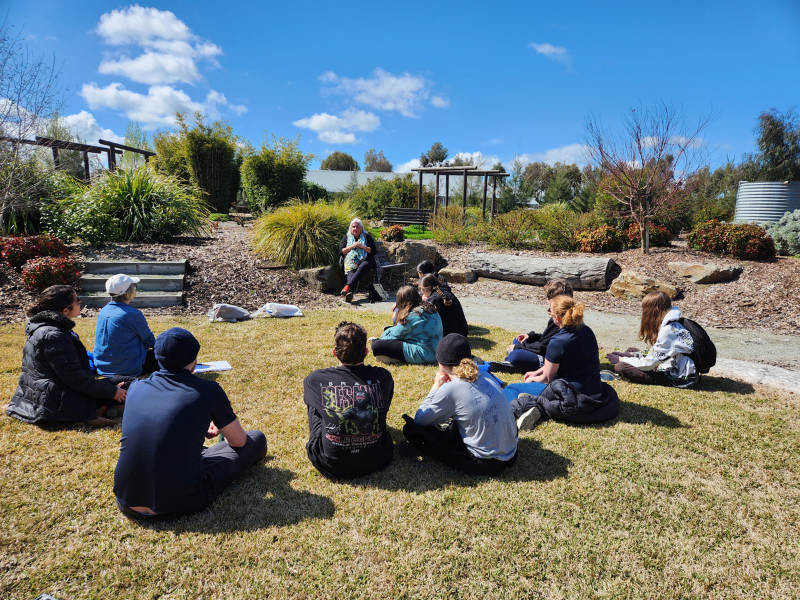
The grants, of up to $20,000, have been awarded by FRRR thanks to support from long-term partner CCI Giving, as well as Macdoch Foundation, Jibb Foundation, Morris Family Foundation, Norman Family Foundation and Rebecca Gorman & John Sevior, all of whom have come on board this year to support an expanded program.
For the last seven years, the focus has been on supporting mental wellbeing in rural communities. However, following the release of the NFF’s National Farmer Wellbeing Report, the six new partners have joined with FRRR to support a second stream of funding focusing specifically on mental health of farmers and farming communities.
Jeremy Yipp, Chair of CCI Giving, said social isolation is a big challenge in remote, rural and regional communities.
“Most applications this round focused on addressing current and emerging mental health issues that are a result of social isolation – an impact of the pandemic that’s still being felt in rural communities. Programs like IAGP mean that small grassroots organisations, community health providers and even local councils can access funding to create opportunities for social connection to support both personal and community resilience,” Mr Yipp said.
Michelle Gortan, CEO of Macdoch Foundation, one of the new IAGP partners, said that applications for the new stream of funding confirmed the importance of community-led initiatives to support mental health.
“The applications for the farmers and farming communities stream confirm that grassroots, non-clinical initiatives play an essential role in filling growing gaps in the system. We’ve been impressed by FRRR’s wide and deep reach into rural and regional communities, which has highlighted the need for investment in projects that promote preventative and responsive mental health approaches in farming and agriculture-dependent communities, all over Australia.”
Jill Karena, FRRR’s People Programs Portfolio Lead, said there are a range of factors in agriculture-dependent communities that affect wellbeing.
“The new farmers and farming communities stream of the IAGP program has given us the chance to offer more funding and support to projects that are filling the gaps in mental health services in farming communities. These places are often under a lot of pressure due to natural disasters, inflation and financial stress – all of which can lead to high levels of mental health struggles. We’re thrilled to have our new partners on board the IAGP program to help promote positive mental health outcomes in these communities,” Ms Karena said.
Ms Karena went on to highlight the importance of supporting initiatives in First Nations communities where mental health projects go hand in hand with culture.
“During this round, we also saw an increase in applications from First Nations organisations, many of which highlighted the vital nature of connection to culture and Country for social and emotional wellbeing of First Nations peoples. It means a lot for us be able to support these initiatives, as we strive to play our part to help close the gap in access for these communities,” Ms Karena said.
A list of the grant recipients and their projects, which include some innovative ways to promote current mental health services to vulnerable cohorts that wouldn’t normally seek assistance – such as working dog training, art, or environmental projects – is available below.
To support more projects like this through FRRR, make a tax-deductible donation at https://frrr.org.au/giving/.
| Organisation | Project | Location | Grant | |||
|---|---|---|---|---|---|---|
| In a Good Place - Round 8 - 2024 | ||||||
| NEW SOUTH WALES | ||||||
| Baaka Cultural Centre Wilcannia Aboriginal Corporation | Baaka Cultural Centre Yarning Circle Project Provide a co-designed culturally appropriate outdoor space for yarning circles and discussions to facilitate cultural knowledge exchange, enhance a sense of belonging and identity and support social and emotional wellbeing for local Aboriginal people. | Wilcannia | $16,500 | |||
| Murrumbidgee Landcare Incorporated | Connecting Young People With Nature Help cultivate a deep sense of social and emotional wellbeing and connection to Country through a series of outdoor learning opportunities for students in need of additional support. | Wagga Wagga | $20,000 | |||
| One Vision Productions Limited | MPOWER PRO - Empowering Our Youth Expand an existing online Mental Health Tool Kit for youth through the rollout of the MPOWER App, and offer access to extended resource content to at-risk young people to help develop awareness skills, mental health knowledge, self-care, emotional regulation, resilience, and healthy relationships. | Byron Bay | $8,700 | |||
| The Returning Indigenous Corporation | Indigenous Health & Wellbeing Community Days Provide care and cultural connection for flood-impacted Indigenous women through regular, trauma informed shared activities, yarning circles and meals to support social and emotional health and wellbeing. | Lismore | $20,000 | |||
| QUEENSLAND | ||||||
| Burnett Inland Economic Development Organisation Inc | The Saleyard and Beyond: Fostering Wellbeing in Rural Farming Communities Leverage the social value of saleyards to promote mental health and wellbeing and local services through direct engagement with farmers at cattle sales. | Murgon | $18,500 | |||
| Royal Flying Doctor Service of Australia (Queensland Section) Limited | Building Mental Health and Wellbeing in Communities Reduce social isolation, develop farmer support networks and increase awareness and access to mental health services using working dog training sessions to demonstrate the practical application of mental and emotional regulation skills. | Winton | $15,042 | |||
| Texas and District Drought Support (TADDS) | Be the Ripple in the Wave Improve resilience, social connection and information sharing by providing community sessions with positive mental health speakers, combined with a shared community meal, across 10 different locations. | Texas | $20,000 | |||
| Toowoomba Hospital Foundation | Calm the Farm Increase resilience and develop supportive networks through targeted workshops that improve the mental health and wellbeing of farmers. | Millmerran | $17,369 | |||
| SOUTH AUSTRALIA | ||||||
| The Food Embassy Incorporated | Healthy Minds, Healthy Farmers, Healthy Landscapes Enhance mental health literacy among farmers in the Southern Adelaide Hills and Fleurieu region of South Australia through a series of free events, codesigned workshops and mental health first aid training. | Mount Compass | $19,980 | |||
| The Pinnaroo Project Association Incorporated | Pinnaroo Connections Cultivate meaningful social connections to reduce social isolation by providing targeted activities featuring guest speakers to deliver positive mental health messages. | Pinnaroo | $20,000 | |||
| TASMANIA | ||||||
| Big Hart Inc | Watershed Half Pipe: Community Activations Harness an activity that requires resilience and is culturally appealing to young people to help reduce stigma, promote help-seeking behaviours, increase sense of belonging, and improve community capacity in mental health crisis response. | Wynyard | $19,835 | |||
| VICTORIA | ||||||
| Corangamite Shire Council | Illuminate U: Youth Creative Arts Program Harness the mental health benefits of creativity and self-reflective activities by using art therapy to support young people showing early signs of mental health issues and help them to develop skills in resilience and emotional flexibility. | Camperdown | $12,697 | |||
| East Wimmera Health Service | Supporting Farmer Mental Wellbeing in St Arnaud Raise awareness, encourage open discussion and promote help seeking in farming communities via a public screening of Just A Farmer, with post-screening community discussion, and providing Mental Health First Aid training. | St Arnaud | $10,250 | |||
| Gunditjmara Aboriginal Co-Operative Limited | Wata Takoort Cultural Camp 2024 Create a culturally enriched and safe environment for Elders, Indigenous community members with disabilities, and their carers to experience greater social and emotional connection to Country and with each other through travel and cultural visitation. | Warrnambool | $10,000 | |||
| Mallee Landcare Group | Mallee Mates Working Dog School Foster support networks and social connection for farmers through working dog training that teach practical mental and emotional regulation and wellbeing skills. | Ouyen | $15,922 | |||
| Rochester Chamber of Commerce and Industry Inc | Amplifying Mental Health Voices: Empowering Community Through Podcasting Raise awareness and normalise mental health discussion and help-seeking in a flood-affected community by providing equipment to create a series of podcasts that showcase resilience and promote local resources, services and community activities. | Rochester | $4,500 | |||
| Swifts Creek Bush Nursing Centre Inc | Back On Track Support farmer wellbeing, reduce social isolation and improve access to local health services by enabling community health outreach to visit isolated properties and small towns to provide health and welfare checks and referrals. | Swifts Creek | $20,000 | |||
| WESTERN AUSTRALIA | ||||||
| 1922 & You Inc | A Centenary Stronger: Nuturing a Mentally Healthy Community Increase the capacity and skill of local leaders to provide a variety of activities that promote social connections and enhance personal and community resilience through the provision of equipment, materials and training. | Corrigin | $17,697 | |||
This article is a personal reflection from our IRCF Program Facilitator in Ulladulla, Monique.
Over the past five years, the IRCF program has woven a rich tapestry of community growth and cultural understanding through an array of touchpoints, workshops, group discussions, events and training sessions. These have allowed community members to network and learn a little bit more about our local Indigenous culture.
As the Ulladulla Community Facilitator, I’ve had the privilege of participating in numerous Welcome to Country ceremonies, each one deepening my appreciation for our connection to this beautiful land and its traditional custodians. I have also enjoyed hearing many community members personalising their Acknowledgements of Country and learning about their connection to this beautiful Yuin nation.
Some of my memorable experiences with community members include:
- Participating in my first smoking ceremony to officially open the High School Sanctuary;
- Witnessing artist Nicole Smede sing in the Dhurga language where her beautiful voice resonated with the spirit of our culture, reminding us of the importance of preserving endangered languages as well as endangered species;
- Didgeridoo meditation with Matt King;
- Standing barefoot, with my hand being painted in ochre;
- Listening to Elders speak about the endangered Black Cockatoo;
- The moving sounds of clapsticks; and
- The graceful dances and storytelling that provided deep insights into Indigenous traditions.
I have also enjoyed sitting in circle with the Ulladulla Yarning Mob to explore how we can help them connect to cultural practices, as well as discussing with local groups how they can learn more about culture and support our local Indigenous service providers.
Throughout our road mapping, workshops, and discussions, we embraced the ancient practice of ‘Sitting in Circle.’ This method, rooted in Indigenous cultural ways, ensures everyone has an equal seat at the table, fostering safe spaces for discussion and allowing for the sharing of passions and perspectives. One local resident, Webby from Lake Conjola, commented that this inclusive hosting method made him feel ‘safe and heard’ and encouraged him to explore various community activities.
Sitting in Circle has also empowered our community to bravely tackle important and difficult conversations. We’ve explored collective needs over individual priorities. Exploring ways to support local Indigenous and other minority groups through our community vision and principles, conversations, offers of support and actions.
I am grateful for the opportunities the IRCF program has provided, allowing myself and many community members to continue our lifelong journey of learning about Indigenous culture. My heartfelt thanks go to the local Indigenous community members who have generously answered our questions, supported and inspired our learning.

